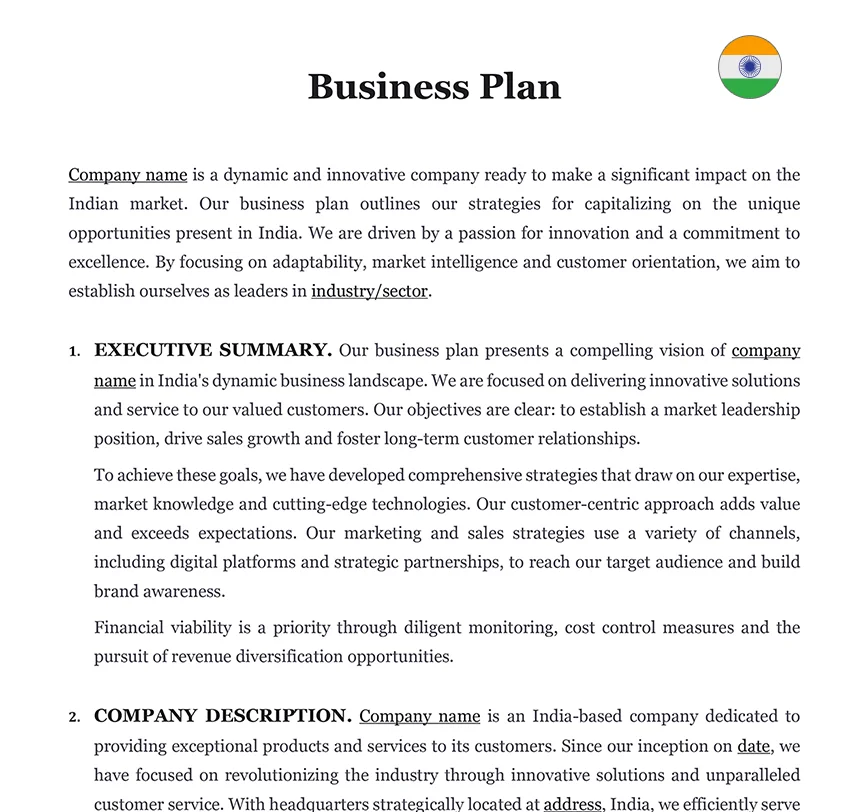Ready to use legal template
Drafted by experienced lawyers
Compliant with Indian law
Ready to use legal template
Drafted by lawyers
Compliant with Indian law
Home › Business contracts › Business Plan
Learn more about Business Plan in India
A business plan holds immense significance as an extra-statutory document. It serves the purpose of organizing company management and facilitating effective communication among the stakeholders who have endorsed the plan. This vital contract outlines the rights and responsibilities of shareholders, provisions for share transfers, operational strategies, and other pertinent information crucial to the agreement. While not mandatory, a business plan is highly recommended for limited companies, notwithstanding its reputation for confidentiality. As an aspiring entrepreneur, shareholder, or company executive, creating a well-structured business plan is a crucial milestone.
Table of contents
What is a Business Plan?
A strategic roadmap, also known as a venture blueprint, is a vital document for entrepreneurs looking to establish a business in India. It serves as a comprehensive framework outlining goals, strategies, and financial projections to ensure the success and sustainability of the enterprise. This detailed outline encompasses market analysis, target audience identification, competitor evaluation, product/service descriptions, marketing plans, and financial projections. By creating a well-crafted roadmap, aspiring business owners can navigate the competitive Indian market with confidence and increase their chances of establishing a successful enterprise.
What is included in a Business Plan?
A strategic roadmap that serves as a blueprint for the success of a venture is known as a business plan. It sets forth the objectives, goals, and strategies that will steer the organization towards profitability and sustainability. In India, a country known for its thriving entrepreneurial ecosystem, having a well-defined roadmap is essential.
This comprehensive document typically includes key elements such as an executive summary, which provides a concise overview of the venture’s mission and unique selling proposition. It also encompasses sections on market analysis, identifying the target audience, and evaluating competition. Moreover, it outlines the venture’s offerings, marketing and sales tactics, and operational strategies.
Financial projections and funding requirements are integral components of this roadmap. This section presents revenue forecasts, projected expenses, and expected profitability. It also highlights the financial needs of the venture, whether through investments, loans, or alternative sources of capital.
Overall, this roadmap acts as a guide for entrepreneurs, investors, and stakeholders. It fosters organizational alignment, aids in decision-making, and serves as a communication tool to attract funding and partnerships. By crafting a well-designed roadmap, entrepreneurs in India can enhance their prospects of success and navigate the competitive business landscape with clarity and confidence.
How to write a Strategic roadmap?
Writing a business plan is a crucial step in setting up and growing a successful business in India. While the specific approach may vary depending on the industry and business type, certain key elements should be included to create a comprehensive and effective business plan.
1. Executive Summary: Start with a compelling executive summary that provides an overview of your business, highlighting its unique value proposition, market opportunity, and competitive advantage. Keep it concise but captivating to grab the reader’s attention.
2. Company Description: Provide detailed information about your company, including its legal structure, mission statement, vision, and core values. Describe your products or services, target market, and key differentiators.
3. Market Analysis: Conduct a thorough analysis of your target market, including market size, trends, and customer demographics. Identify your competitors and analyze their strengths and weaknesses. Showcase your understanding of the market and explain how your business will meet customer needs.
4. Marketing and Sales Strategy: Outline your marketing and sales plans, including pricing strategies, distribution channels, and promotional activities. Define your target customers and explain how you will reach and acquire them. Detail your sales forecasts and strategies for growth.
5. Operations and Management: Describe your business operations, including the organizational structure, key team members, and their roles and responsibilities. Provide an overview of your production or service delivery process and highlight any unique operational aspects.
6. Financial Projections: Present a realistic and well-supported financial forecast, including revenue projections, expense estimates, and cash flow analysis. Include key financial metrics such as break-even point, return on investment, and profitability targets.
7. Risk Assessment: Identify potential risks and challenges that your business may face and outline strategies to mitigate them. This demonstrates your proactive approach to managing risks and instills confidence in potential investors.
8. Appendix: Include any supporting documents, such as market research data, product prototypes, legal agreements, or resumes of key team members.
Remember to tailor your business plan to the specific needs and requirements of your business. It should be a dynamic document that can be regularly reviewed and updated as your business evolves. Seek feedback from mentors, advisors, and industry experts to ensure your business plan is comprehensive, realistic, and compelling.
Why is a Business Plan important in India?
An entrepreneurial roadmap holds significant significance in India’s business arena for various reasons.
Firstly, it acts as a strategic guide for business owners, delineating objectives, strategies, and action plans. In India’s competitive market, a well-crafted roadmap aids in setting precise targets and charting a course to achieve them. It brings clarity and focus to the enterprise, facilitating informed decision-making and efficient resource allocation.
Secondly, it serves as a valuable tool for attracting investors and securing financing. Investors and financiers often require a comprehensive roadmap to assess the feasibility and potential of a business venture. A meticulously prepared document showcasing market research, financial projections, and growth strategies enhances credibility and boosts the prospects of obtaining funding.
Moreover, it fosters effective communication and collaboration among team members and stakeholders. In India’s diverse business landscape, characterized by partnerships and collaborations, a well-documented plan ensures alignment and concerted efforts towards shared objectives. It serves as a reference point for decision-making and unifies everyone around the core vision and mission.
Additionally, it assists in identifying potential risks and challenges prevalent in the Indian market. Thorough market research and analysis enable entrepreneurs to discern market trends, competitive forces, and regulatory requirements. This knowledge empowers businesses to proactively address challenges and devise risk mitigation strategies.
In summary, an entrepreneurial roadmap in India provides invaluable direction, aids in financing, promotes collaboration, and helps manage risks. It serves as a blueprint for success, guiding businesses towards their goals and enhancing their prospects of achieving sustainable growth in India’s dynamic business landscape.
What is the purpose of the Venture blueprint?
The purpose of a business plan is to serve as a comprehensive roadmap that outlines the goals, strategies, and operations of a business. In India, a well-crafted business plan is essential for entrepreneurs, startups, and established companies alike. It serves multiple purposes that are crucial for the success and growth of a business.
1. Clarity and Direction: A Venture blueprint provides clarity about the purpose, vision, and mission of the business. It helps articulate the goals and objectives, identifying the strategies and actions required to achieve them. By defining the direction of the business, it serves as a guiding document for decision-making and resource allocation.
2. Communication and Funding: A business plan serves as a communication tool to convey the business concept, market analysis, competitive advantage, and financial projections to potential investors, lenders, or partners. It demonstrates the viability and potential of the business, increasing the chances of securing funding or partnerships.
3. Financial Planning and Management: The financial section of a Business proposal outlines the expected revenue, costs, and profitability of the business. It helps in estimating the startup costs, projecting cash flows, and determining the financial feasibility of the venture. A business plan facilitates financial management by setting financial targets and providing a framework for monitoring and evaluating performance.
4. Market Analysis and Strategy: A business plan includes a detailed analysis of the target market, customer segments, competition, and industry trends. It helps identify the target audience, assess market demand, and develop effective marketing strategies to reach and engage customers. It also outlines the unique selling proposition and competitive advantage of the business.
5. Operational Guidance: A Business proposal provides an operational framework by outlining the organizational structure, key roles, and responsibilities. It defines the operational processes, production methods, and distribution channels. A well-developed plan enables efficient resource allocation, inventory management, and overall operational efficiency.
6. Risk Assessment and Mitigation: A Venture blueprint includes a thorough assessment of potential risks and challenges faced by the business. It helps identify and address vulnerabilities, develop contingency plans, and implement risk management strategies. By proactively identifying and mitigating risks, a business plan increases the chances of success and resilience.
In summary, the purpose of a Strategic roadmap in India is to provide a strategic roadmap, attract funding, guide financial management, inform marketing strategies, support operational efficiency, and mitigate risks. It is a dynamic document that evolves with the business, serving as a reference point to align efforts, monitor progress, and make informed decisions.
What are the advantages ?
A well-crafted business plan offers numerous advantages for businesses operating in India. It serves as a powerful tool that provides clarity, strategic direction, and a competitive edge. Here are some key advantages of having a comprehensive business plan:
1. Roadmap for Success: A business plan provides a roadmap that outlines the path to success. It helps define goals, strategies, and action plans, allowing entrepreneurs and business owners to stay focused and aligned with their objectives. By setting clear milestones and timelines, a business plan acts as a guide for decision-making and progress tracking.
2. Attracting Investors and Funding: A well-prepared business plan enhances the credibility and attractiveness of a business to potential investors, lenders, or partners. It showcases the market potential, growth opportunities, and financial projections, giving stakeholders confidence in the business’s viability and potential return on investment. A solid business plan significantly increases the chances of securing funding or partnerships.
3. Effective Resource Allocation: A business plan enables businesses to allocate their resources effectively. It helps identify the necessary resources, such as capital, personnel, technology, and equipment, and allocate them optimally based on the business’s priorities and needs. This ensures efficient use of resources, minimizing waste and maximizing productivity.
4. Risk Management: A business plan allows businesses to assess potential risks and develop strategies to mitigate them. By conducting a thorough analysis of market risks, competition, and internal vulnerabilities, businesses can proactively address challenges. Having risk mitigation strategies in place increases the chances of business success and resilience.
5. Marketing and Sales Strategy: A business plan includes a detailed market analysis, customer segmentation, and marketing strategies. It helps businesses identify their target audience, understand customer needs, and develop effective marketing and sales approaches. A well-defined marketing strategy ensures efficient customer acquisition, retention, and business growth.
6. Operational Efficiency: A business plan helps streamline operations by defining organizational structure, roles, and responsibilities. It outlines operational processes, production methods, and distribution channels. This clarity and structure enable businesses to operate more efficiently, reducing inefficiencies and improving overall performance.
7. Evaluation and Monitoring: A business plan serves as a benchmark for evaluating and monitoring business performance. By comparing actual results with the projected targets and milestones outlined in the plan, businesses can identify areas of improvement and take corrective actions. Regularly reviewing the business plan enables businesses to adapt to changing market conditions and stay on track towards their goals.
In summary, a well-developed business plan provides a roadmap for success, attracts investors and funding, enables effective resource allocation, facilitates risk management, supports marketing and sales strategies, enhances operational efficiency, and provides a framework for evaluation and monitoring. It is an essential tool for businesses in India to thrive and achieve their long-term objectives.
SPECIAL OFFER
Startup
15 Document Package
Essential documents for running your business in India
Share information
Why Themis Partner ?
Make documents forhundreds of purposes
Hundreds of documents
Instant access to our entire library of documents for India.
24/7 legal support
Free legal advice from our network of qualified lawyers.
Easily customized
Editable Word documents, unlimited revisions and copies.
Legal and Reliable
Documents written by lawyers that you can use with confidence.




